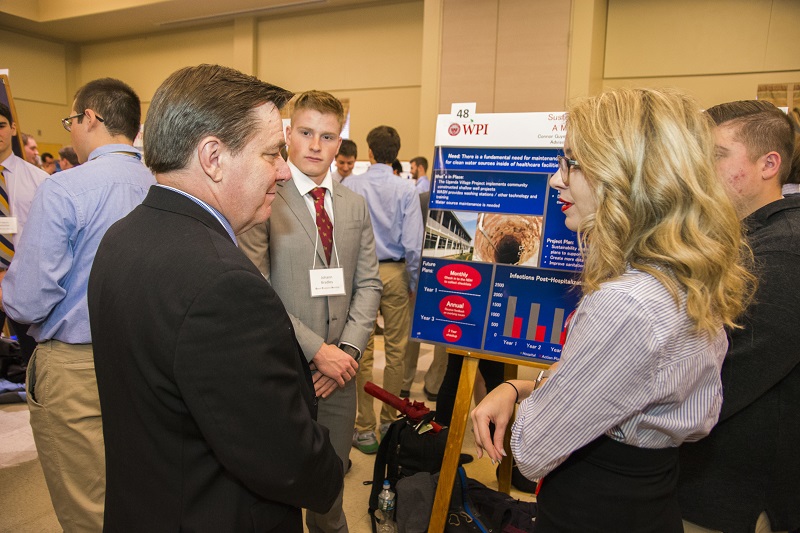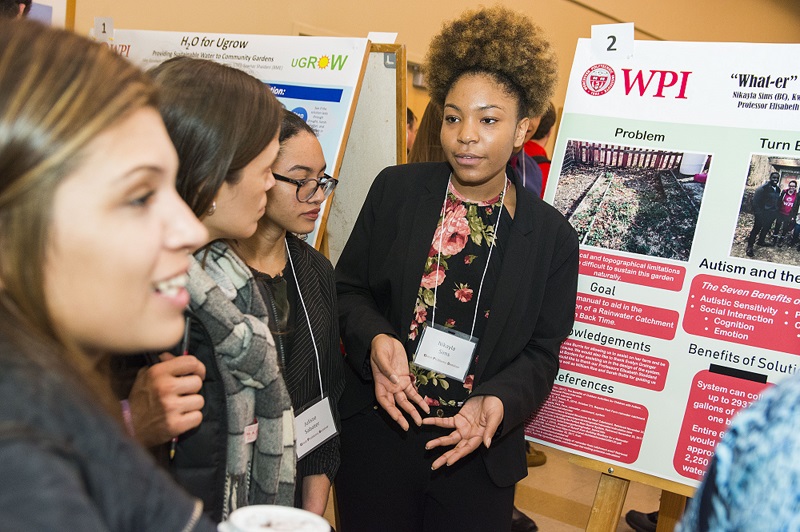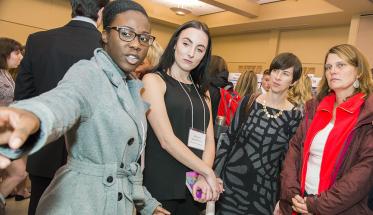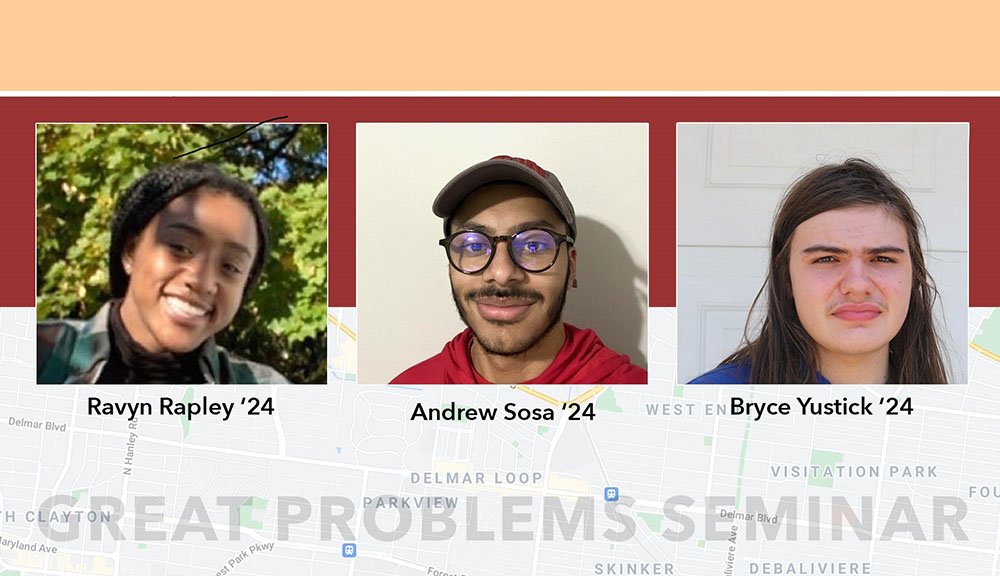While most students were wrapped up in preparing for finals week, many first-year students at WPI had something extra on their plates: Poster Presentation Day for the Great Problems Seminar (GPS).
An optional-two term course, the GPS immerses nearly 300 first-year students into university-level research and introduces them to WPI’s project-based curriculum. Each of the seven GPS seminars is taught by two faculty members from various departments and focuses on a separate great problem. Students are divided into teams of three to five to solve a problem on that topic, making for an interdisciplinary project experience that’s a cornerstone of the WPI curriculum.

Students presented their work Tuesday afternoon.
On the 11th annual Poster Presentation Day, held Tuesday, Dec. 12 in the Rubin Campus Center Odeum, the student teams presented the work they had been collaborating on over the course of their first two terms on campus. Faculty, staff, students, parents, alumni, and friends had the opportunity to view the projects and learn more about the teams’ work before voting for best-in-show.
Students this year had the choice of centering their projects in one of seven general topics: Food Sustainability; Heal the World; Extinction: Who Will Survive; The World’s Water; Ignorance Is Not Bliss; Livable Cities; and Designing Process: Living on the Edge.
And the winners are . . .
The World’s Water – Improved Irrigation for Jordan’s Farms, Rishi Gupta, Amelia Papi, Derek Byrne, Nicky Kring.
Extinction: Who Will Survive – Bringing Back Bats: Management Systems for White Nose Syndrome, Kathleen Donovan, Samantha Grillo, Cameron LeBlanc, Elijah Levi
Ignorance Is Not Bliss: Can Schools & Teaching Help? – Speaking to Success, Emily Baker, Matthew Bisson, Scott Rementer
Food Sustainability – Fighting Ignorance: Freshmen Malnutrition, Lokesh Gangaramaney, Manon Miller, Despina Tomboulides
Heal the World – Are You the One? Familial Hypercholesterolemia in Worcester, MA, Camryn Berry, Shanna Bonanno, Michelle Fleming, Deborah Fontanez, Talia Vaughn
Livable Cities – Pedestrian and Environmentally Focused Infrastructure, Kyle Coleman, Aidan Mayer, Kelley Townley, Kristophe Zephyrin
Designing Process: Living on the Edge – Angolan Housing Design for Congolese Refugees, Alisha Anderson, Sophie Antoniou, Abigail O’Sullivan, Hannah Schulz
People’s Choice – (Heal the World), The Protection Page Plan, Maeghan Desmarais, Kayla Krom, Patrick Macaulay, Lara Padir, Charlotte White
Project topics covered a broad range of ideas, from Piping Plover Protection Party and Speaking to Success, to Get Vocal for Local and Mental Health Following Traumatic Events. While some students chose topics based on mutual interests, others were rooted in personal experience.

A student discusses her group’s poster and project.
Rachael Sallie, Kyle Ehrlich, Matthew St. Louis, and Nina Taurich decided on their topic after Sallie explained that her family noticed the decrease in bats while camping, and the negative effects their absence was having on the environment. Their project, Blind Justice for Bats, offers solutions on protecting the bat populations, including placing “bat boxes” in urban areas and creating a picture book to help children learn about bats and conservation efforts to help them.
“It’s a good opportunity to try out different things and find your voice through writing papers and working in teams,” says St. Louis.
A first-year seminar course can seem like an easy A, but students quickly learned that wasn’t the case with the GPS.
“I thought it was going to be a lot easier, to be honest,” admits Kristophe Zephyrin. “But we love this topic (see project listing above), and actually ended up doing the most work for this class, just because we were so passionate about it.”
Townley agrees, saying that she was driven by the fact that their work could create tangible change. “We’re not handing in a 20-page paper,” she explains. “It’s a 60-page plan that’s given to cities and gives them the option to adjust their infrastructure based on the six solutions that we’ve given.”
The students weren’t the only ones passionate about the topics—their professors were as well. “They [Marja Bakermans and Geoffrey Pfeifer] were really supportive when we wanted to try something unexpected,” Townley says. “It was nice to have them on our side, saying, ‘Go for it.’”
From their professional dress, firm handshakes, and general passion as they discussed their projects with guests, the students’ enthusiasm was clear throughout the day. The GPS showed them just what they’re capable of, and gave them a sneak peek into what they can expect to achieve going forward at WPI.
“This is a class that prepared us for our own individual futures,” Mayer says. “Something we all share is that we just really want to help the world, and I think this is a good introduction on how to do that.”
- By Allison Racicot




